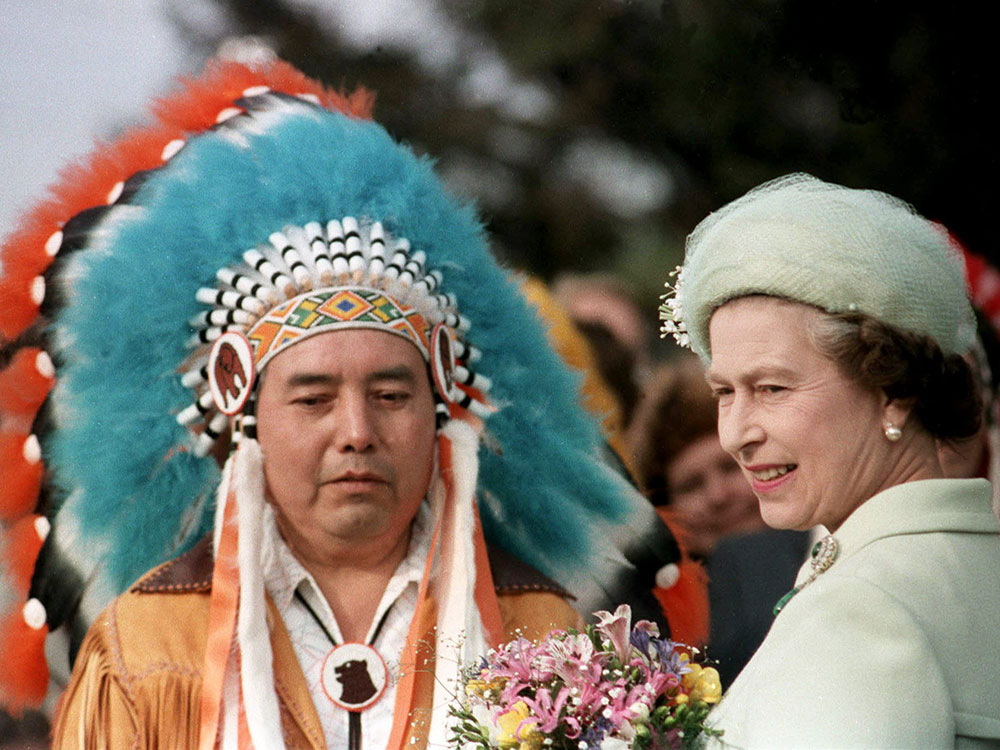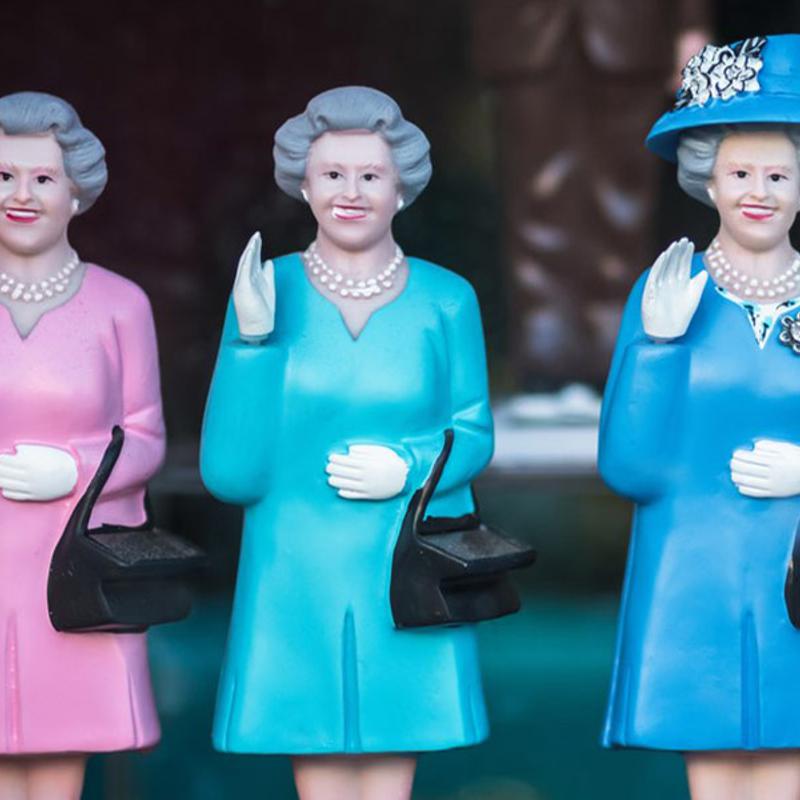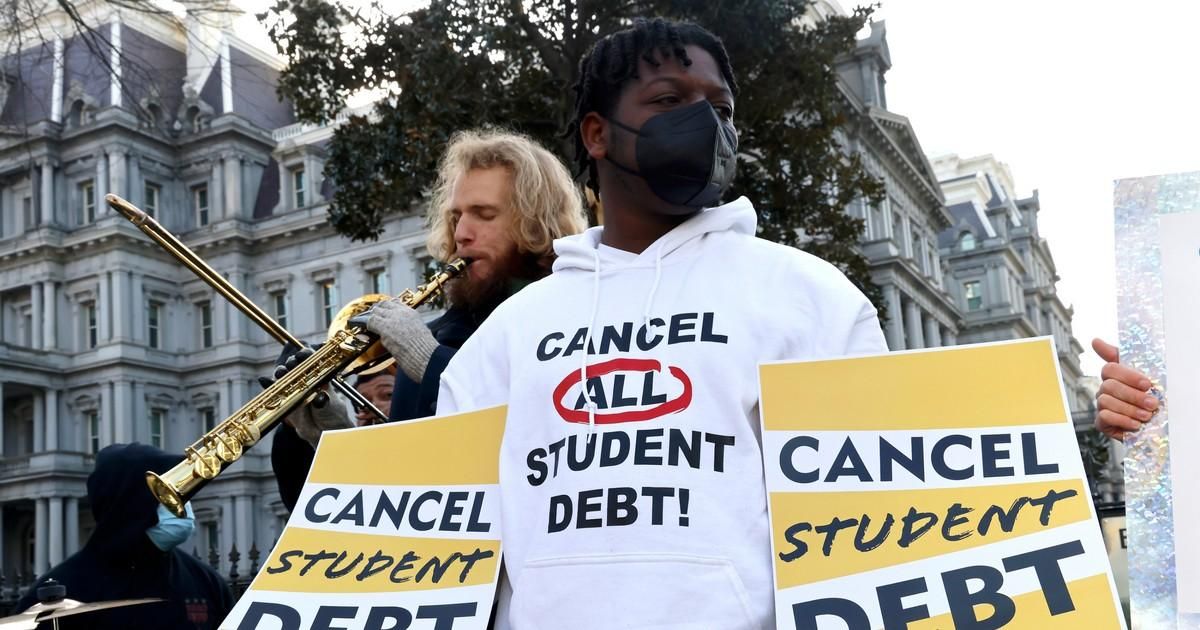Great Britain hasn't just lost a monarch. The British social welfare state, once a shining beacon for Western democracies, is also dying.

Visitors and tourists at Piccadilly Circus interact below a colour image of Queen Elizabeth II which is on display on the large scale advertising screens on the day following her death on 9th September 2022 in London, United Kingdom. The Queen, who was 96 reigned as monarch of the UK and Commonwealth for 70 years. (Photo: Mike Kemp/In Pictures via Getty Images)
RICHARD ESKOW
September 9, 2022
Every human death is a loss. But Queen Elizabeth lived a long and, from most accounts, good life. The people close to her have lost a mother, a friend, a real person. They shouldn't be dismissed. Neither should the British citizens who mourn her. The grief people feel for a public figure is real, even if what they're really mourning are the passing days of their lives.
I wish we lived in a world where it wasn't necessary to put this particular death into perspective, but we don't. Shortly before her death, the Queen met with the new prime minister of Great Britain. Liz Truss was chosen for that position by the less than 200,000 dues-paying members of the Conservative Party, some 0.3 percent of the British electorate. That's right: a handful of party stalwarts, predominately white, male, and older, paid for the privilege of choosing the country's leader. They call that "democracy."
The grief people feel for a public figure is real, even if what they're really mourning are the passing days of their lives.
Truss is a hard-right extremist in the Trump mold, a pro-fossil-fuel extremist who has already begun filling sensitive environmentally-related positions with climate deniers like Jacob Rees-Mogg. As a result, more people will die. More than half of Britons think she will be a "poor" or "terrible" Prime Minister, and they're sure to be right.
It didn't have to be this way. Not so long ago, the British social welfare state was an example for the world to follow. Its dismantlement began under Margaret Thatcher and was carried on by the Bill Clinton-like "New Labour" leadership of Tony Blair in the 1990s. Once back in office, the Conservatives stepped up that effort with ferocious abandon. Post-industrial Britain is reeling from the upward transfer of wealth now, just like its breakaway American colony. Special relationship, indeed.
A New York Times article remarked in passing that the Queen's family "is known for its longevity," noting that Elizabeth's mother died in 2002 at the age of 101. That's not just good genes. The House of Windsor receives the best medical care imaginable, is fed a steady and healthy diet, and is housed in comfort. Those comforts, promised to everyone by the British social welfare state, have an enormous impact on longevity. A report from the King's Fund notes that in 2018–20, males in the poorest 10 percent of areas in England died almost a decade earlier than males in the 10 percent wealthiest areas, with an 8-year difference among females. Each of these deaths is a tragedy, too.
What's more, as in the US, conservative mismanagement of the Covid-19 pandemic took many more lives than necessary in Great Britain, made worse by the ongoing evisceration of the NHS. At least 168,000 excess deaths in Britain have been estimated since the pandemic began. (The population of Great Britain is roughly one-fifth that of the United States; Americans should multiply these numbers by five to get a visceral sense of their impact.)
Most of these unremarked deaths occurred in considerably less comfortable places than Balmoral. A recent study showed that 90,000 Britons die in a state of poverty every year. More than one in four working-age women die impoverished, a number that climbs substantially among minorities.
The war in Ukraine has resulted in energy shortages which have hit the British population especially hard. As the Associated Press reports, "A cost-of-living crisis in Britain is about to get worse, with millions of people paying about 80% more a year on their household energy bills starting in October ... people will pay 3,549 pounds ($4,188) a year for heating and electricity."
Those shortages haven't hit everybody hard. They've opened the floodgates for energy company profiteering, with Bloomberg reporting that "UK gas producers and electricity generators may make excess profits totaling as much as £170 billion ($199 billion) over the next two years."
Liz Truss's preferred "solution" is to use government funds to cap out-of-pocket consumer costs at $2,800 US per households. That's still very expensive for many Britons. Her proposal also represents an enormous transfer of wealth from the British public sector—that is, the British people—to the same energy companies that have been scooping up public wealth since the war began. The obvious solution, a windfall profits tax on those companies, is not on the table.
This entire crisis could have been avoided Thatcher had not sold off the publicly-owned British energy sector to private interests in the 1980s. That dismantlement of public resources is directly responsible for the current immiseration of the British people.
It is this crisis that led to the bizarre spectacle of a British morning news program's "spin-the-wheel" contest for struggling listeners: we'll give you 1,000 pounds or pay your energy bill for four months, whichever the wheel decides. As the Washington Post reports:
Viewers of British TV show, "This Morning," watched as the wheel spun, eventually coming to a stop. "It's your energy bill!" host Phillip Schofield shrieked. The caller expressed relief at his prize, which would cover the costs of his bill for four months. "Oh my god, thank you," the winner said.
The Post says that people called the show "tone deaf," "distasteful" and "dystopian," while Russian television gloated. It's another flicker of flame from Britain's burning social contract.
Play
Great Britain hasn't just lost a monarch. The British social welfare state, once a shining beacon for Western democracies, is also dying. On a human level, every death is an occasion for mourning. But who mourns the needlessly dead or the system that could have saved them? If people could learn to care half as much about every victim of poverty or inadequate healthcare as they do about one person, we might yet build a just society.
They will play "God Save the Queen" and "God Save the King" many times in the days to come. But who will save the people?
Every human death is a loss. But Queen Elizabeth lived a long and, from most accounts, good life. The people close to her have lost a mother, a friend, a real person. They shouldn't be dismissed. Neither should the British citizens who mourn her. The grief people feel for a public figure is real, even if what they're really mourning are the passing days of their lives.
I wish we lived in a world where it wasn't necessary to put this particular death into perspective, but we don't. Shortly before her death, the Queen met with the new prime minister of Great Britain. Liz Truss was chosen for that position by the less than 200,000 dues-paying members of the Conservative Party, some 0.3 percent of the British electorate. That's right: a handful of party stalwarts, predominately white, male, and older, paid for the privilege of choosing the country's leader. They call that "democracy."
The grief people feel for a public figure is real, even if what they're really mourning are the passing days of their lives.
Truss is a hard-right extremist in the Trump mold, a pro-fossil-fuel extremist who has already begun filling sensitive environmentally-related positions with climate deniers like Jacob Rees-Mogg. As a result, more people will die. More than half of Britons think she will be a "poor" or "terrible" Prime Minister, and they're sure to be right.
It didn't have to be this way. Not so long ago, the British social welfare state was an example for the world to follow. Its dismantlement began under Margaret Thatcher and was carried on by the Bill Clinton-like "New Labour" leadership of Tony Blair in the 1990s. Once back in office, the Conservatives stepped up that effort with ferocious abandon. Post-industrial Britain is reeling from the upward transfer of wealth now, just like its breakaway American colony. Special relationship, indeed.
A New York Times article remarked in passing that the Queen's family "is known for its longevity," noting that Elizabeth's mother died in 2002 at the age of 101. That's not just good genes. The House of Windsor receives the best medical care imaginable, is fed a steady and healthy diet, and is housed in comfort. Those comforts, promised to everyone by the British social welfare state, have an enormous impact on longevity. A report from the King's Fund notes that in 2018–20, males in the poorest 10 percent of areas in England died almost a decade earlier than males in the 10 percent wealthiest areas, with an 8-year difference among females. Each of these deaths is a tragedy, too.
What's more, as in the US, conservative mismanagement of the Covid-19 pandemic took many more lives than necessary in Great Britain, made worse by the ongoing evisceration of the NHS. At least 168,000 excess deaths in Britain have been estimated since the pandemic began. (The population of Great Britain is roughly one-fifth that of the United States; Americans should multiply these numbers by five to get a visceral sense of their impact.)
Most of these unremarked deaths occurred in considerably less comfortable places than Balmoral. A recent study showed that 90,000 Britons die in a state of poverty every year. More than one in four working-age women die impoverished, a number that climbs substantially among minorities.
The war in Ukraine has resulted in energy shortages which have hit the British population especially hard. As the Associated Press reports, "A cost-of-living crisis in Britain is about to get worse, with millions of people paying about 80% more a year on their household energy bills starting in October ... people will pay 3,549 pounds ($4,188) a year for heating and electricity."
Those shortages haven't hit everybody hard. They've opened the floodgates for energy company profiteering, with Bloomberg reporting that "UK gas producers and electricity generators may make excess profits totaling as much as £170 billion ($199 billion) over the next two years."
Liz Truss's preferred "solution" is to use government funds to cap out-of-pocket consumer costs at $2,800 US per households. That's still very expensive for many Britons. Her proposal also represents an enormous transfer of wealth from the British public sector—that is, the British people—to the same energy companies that have been scooping up public wealth since the war began. The obvious solution, a windfall profits tax on those companies, is not on the table.
This entire crisis could have been avoided Thatcher had not sold off the publicly-owned British energy sector to private interests in the 1980s. That dismantlement of public resources is directly responsible for the current immiseration of the British people.
It is this crisis that led to the bizarre spectacle of a British morning news program's "spin-the-wheel" contest for struggling listeners: we'll give you 1,000 pounds or pay your energy bill for four months, whichever the wheel decides. As the Washington Post reports:
Viewers of British TV show, "This Morning," watched as the wheel spun, eventually coming to a stop. "It's your energy bill!" host Phillip Schofield shrieked. The caller expressed relief at his prize, which would cover the costs of his bill for four months. "Oh my god, thank you," the winner said.
The Post says that people called the show "tone deaf," "distasteful" and "dystopian," while Russian television gloated. It's another flicker of flame from Britain's burning social contract.
Play
Great Britain hasn't just lost a monarch. The British social welfare state, once a shining beacon for Western democracies, is also dying. On a human level, every death is an occasion for mourning. But who mourns the needlessly dead or the system that could have saved them? If people could learn to care half as much about every victim of poverty or inadequate healthcare as they do about one person, we might yet build a just society.
They will play "God Save the Queen" and "God Save the King" many times in the days to come. But who will save the people?
Our work is licensed under Creative Commons (CC BY-NC-ND 3.0). Feel free to republish and share widely.

RICHARD ESKOW
is a freelance writer. Much of his work can be found on eskow.substack.com. His weekly program, The Zero Hour, can be found on cable television, radio, Spotify, and podcast media. He is a senior advisor with Social Security Works











